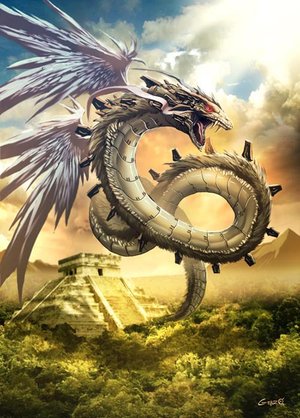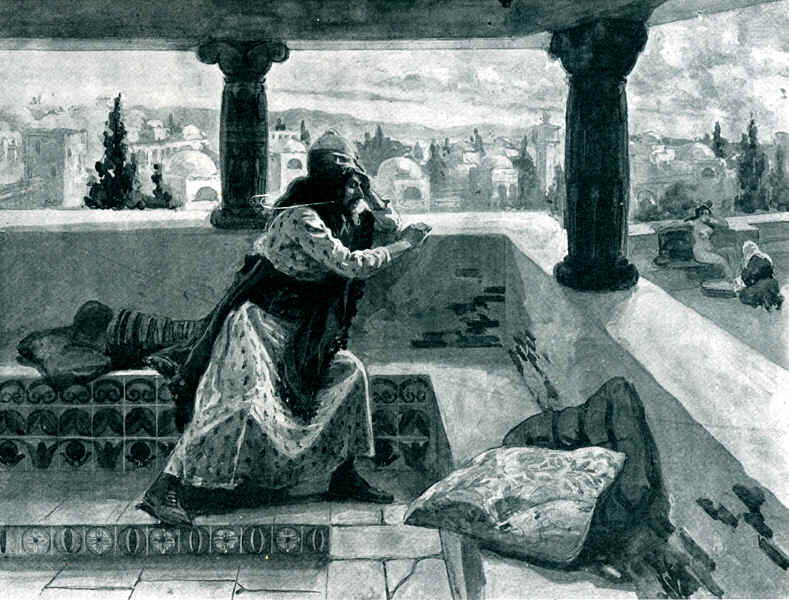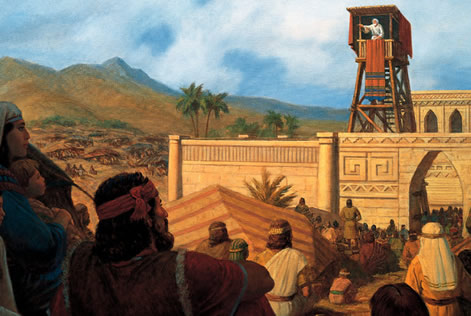OK, here we go. As everyone in my class knows, I have been able to navigate the Old Testament so far and plan to continue by finding the "types and shadows" of the Savior in the stories, events and people of the Old Testament. The "Testament," after all, is one of the Lord Jesus Christ. As James Ferrell has observed, "There is no greater testament of Christ and his divinity and mission than the testament hidden below the surface of the Old Testament. Every story is his story, preserved at a level that would survive the loss of every plain and precious thing. (Ferrell, 2009, p. 5.)
So, as we have examined the lessons of the Old Testament we have done so with an eye toward that story "below the surface" that typifies the Savior and his plan of happiness.
A couple of weeks ago, our lesson covered the children of Israel as they rebelled in the wilderness and were set upon by the "fiery serpents," and were then offered deliverance from their bites if they would look upon an image of those serpents fastened to Moses' staff. (
Numbers 21:5-9)
The type of the brazen serpent on the staff of Moses is an obvious type of the Savior. But what about the serpents themselves? We didn't have the time to explore this fully in class and I wasn't able to arrive at any conclusions when I was preparing the lesson. But I had my lightning bolt moment yesterday while reading for this week's lesson. So, even though I'm two weeks late, I thought I'd make this the subject of this post.
Again, the brazen serpent that Moses raised up was an obvious type of the Savior. Nephi, the son of Helaman observed, ""Yea, did he [Moses] not bear record that the Son of God should come? And as he lifted up the brazen serpent in the wilderness, even so shall he be lifted up who should come." And Nephi continued, "And as many as should look upon that serpent should live, even so as many as should look upon the Son of God with faith, having a contrite spirit, might live, even unto that life which is eternal" (
Helaman 8:14-15.)
But interestingly, Nephi, the son of Lehi referred to the serpents as "fiery
flying serpents" when he made his observation, "He sent
fiery flying serpents among them; and after they were bitten he prepared a way that they might be healed; and the labor which they had to perform was to look; and because of the simpleness of the way, or the easiness of it, there were many who perished" (
1 Nephi 17:41.) But Isaiah also made reference to "fiery flying serpents." (
Isaiah 14:29;
30:6.)

But the tradition among the inhabitants of the new world apparently was prevalent and persistent as we see the Aztec depiction of Quetzalcoatl as a feathered [for flight?] serpent, but he was described as a "bearded white god" who had come and promised to return--a god for whom they mistook Hernando Cortez when he arrived. The Mayans called him "Kukulcan," and the "feathered serpent deity was worshiped by other meso-American cultures, anciently.

There is likewise an interesting resemblance between some depictions of Quetzalcoatl and the traditional medical insignia that is so common today and which was modeled after the brazen serpents of Moses' day that promised healing to the children of Israel.
So, what's the deal with the serpents if they are a type, a symbol and a shadow of the Savior? How can something so closely similar to the symbol of salvation be the means of the suffering from which they needed to be saved? In particular, of what, in particular, are the serpents in the experience related in Numbers 21 a type? Remember that a type is "an actual historical reality which pointed beyond itself to a greater and more powerful reality." (Millett, 1985, p. 197.)
Consider, as a background, that the entire experience of the Israelites is a type. They are in bondage to Egypt, much like we are to the world and worldly things prior to being called forth out of the world [Egypt] by a prophet's voice. A sacrifice is made [passover/broken heart and contrite spirit] and they pass through a body of water [baptism]. They enter into the wilderness where the Lord was to try and to prove them--where they would be required to endure in faith to the end before entering their promised land. The obvious point of this is that in that wilderness--under covenant--what they experience relates directly to those of us who have likewise found that "the gate by which ye should enter is repentance and baptism
by water;" (
2 Nephi 31:17.)
So, once again, how do the serpents figure into the equation? Consider this possibility: The serpents are a type and representation of the law--be it the law of Moses or the commandments that we are now obligated to obey as a result of our covenants.
Just this morning, in our family scripture reading time, we read this verse in Alma 34: "And behold, this is the whole meaning
of the law, every whit pointing to that great and last sacrifice; and that great and last sacrifice will be the Son of God, yea, infinite and eternal." (
Alma 34:14.)
You see, it is the law and our individual failure to live up to our commitments to obey it that "bite us" and require us to "look" to the Savior for salvation. Both the law and the salvation from our failure to live it come directly from the Lord, hence the representation of both as the same "fiery, flying serpent." We all have made the covenant and the promise to keep the commandments and to obey the word of the Lord and every single one of us has (and will again) fail to live up to that commitment throughout our lives, revealing our individual weaknesses. But, as our sins reveal our weakness and our need to look to the Savior for salvation, we strive to go to him for aid. "And if men come unto me I will show unto them their weakness. I give unto men weakness that they may be humble; and my grace is sufficient for all men that humble themselves before me; for if they humble themselves before me, and have faith in me, then will I make weak things become strong unto them." (
Ether 12:27.)
We need not be dismayed by our failures, as they were accounted for by the Atonement to allow us to work and to strive and to learn with the opportunity to overcome, without being cast off forever! All is according to the plan of our Heavenly Father and, in fact, is essential to maintaining our agency, an essential element in our mortal testing and proving. "And thou shalt remember all the way which the
Lord thy God led thee these forty years in the wilderness, to humble thee,
and to prove thee, to know what
was in thine heart, whether thou wouldest keep his commandments, or no." (
Deut. 8:2.)
Think it over! Below is a table created by James Ferrell to further illustrate this point (since I can't put the table on, I will separate each column into the three categories. So, match "1" under "ELEMENT" w/ "1" in the other categories, "2" with the others, etc.):
ELEMENT
- The people sinned.
- The Lord created a condition to "bite" them.
- This condition awakened the people to their sins.
- The thing which awakened Israel to their sins was prepared also to be the way through which they could be healed from the effect of their sins.
- The means of deliverance could not of itself save spiritually, but pointed to the Savior as the source of salvation.
- Those who looked to the temporal type of spiritual salvation were blessed with life, while those who didn't were cursed with death.
FIERY SERPENT
- "And the people spake against God, and against Moses, Wherefore have ye brought us up out of Egypt to die in the wilderness?" (Numbers 21:5)
- "And the Lord sent fiery serpents among the people, and they bit the people; and much of the people of Israel died." (Numbers 21:6.)
- "Therefore the people came to Moses, and said, We have sinned, for we have spoken against the Lord, and against thee; pray unto the Lord, that he take away the serpents from us." (Numbers 21:7.)
- "And the Lord said unto Moses, Make thee a fiery serpent, and set it upon a pole: and it shall come to pass, that every one that is bitten, when he looketh upon it, shall live." (Numbers 21:8.)
- "Behold, [the Savior] was spoken of by Moses; yea, and behold a type was raised up in the wilderness, that whosoever would look upon it might live" (Alma 33:19) "And as Moses lifted up the serpent in the wilderness, even so must the Son of man be lifted up; That whosoever believeth in him should not perish, but have eternal life." (John 3:14-15)
- "Behold, he was spoken of by Moses; yea, and behold a type was raised up in the wilderness, that whosoever would look upon it might live. And many did look and live.... But there were many who were so hardened that they would not look, therefore they perished. Now the reason they would not look is because they did not believe that it would heal them." (Alma 33:19-20.)
LAW OF MOSES
- The people rejected the Lord and turned back to idolatry (see Exodus 32:1-6), thereby violating the covenant they had made (Ex 24:3-8).
- "The law was added because of transgressions" (JST, Gal. 3:19). "Now, how could a man repent except he should sin? How could he sin if there was no law? How could there be no law save there was a punishment affixed, and a just law given" (Alma 42:17-18) "that ...all the world may become guilty before God." (Rom. 3:19).
- This punishment and law "brought remorse of conscience unto man....[By this means there was] a repentance granted" (Alma 42:18, 22), "for by the law is the knowledge of sin" (Rom. 3:20).
- "It was expedient that there should be a law given to the children of Israel, yea even a very strict law; for they were a stiffnecked people, quick to do iniquity, and slow to remember the Lord their God; Therefore there was a law given them, yea, a law of performances and of ordinances, a law which they were to observe strictly from day to day, to keep them in remembrance of God and their duty towards him" (Mosiah 13:29-30).
- "For the law having a shadow of good things to come, and not the very image of the things, can never with those sacrifices which they offered year by year continually make the comers thereunto perfect" (Heb 10:1). "And behold, this is the whole meaning of the law, every whit pointing to that great and last sacrifice; and that great and last sacrifice will be the Son of God, yea infinite and eternal" (Alma 34:14). "Wherefore the law was [the] schoolmaster to bring [Israel] to Christ" (Gal. 3:24).
- "And the Lord commanded us to do all these statutes, to fear the Lord our God, for our good always, that he might preserve us alive, as it is at this day. And it shall be our righteousness, if we observe to do all these commandments before the Lord our God, as he hath commanded us" (Deut. 6:24-25).
(Ferrell, 2009, p. 215.)
References:
Ferrell, J. (2009).
The hidden christ. Salt Lake City, UT: Deseret Book Co.
Millett, R. (1985).
Studies in scripture, volume 3: Genesis to samuel. Salt Lake City, UT: Deseret Book Co.










